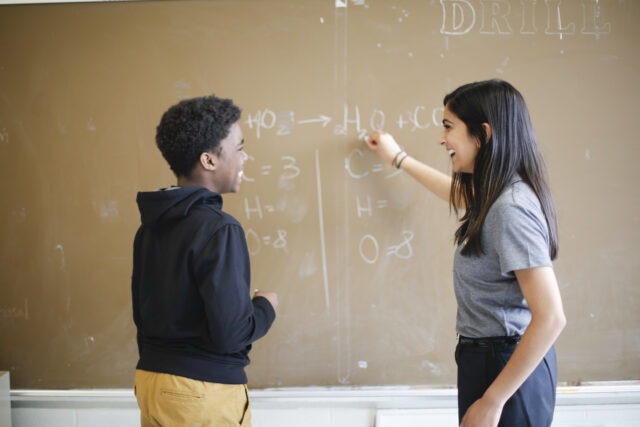Relationships are Key to Students’ Learning Recovery
While the pandemic has taken a toll on everyone, our children and young adults, in particular, are struggling with COVID-19’s consequences, which include disrupted learning and increased stress that threaten their learning, mental health, and well-being. A lot of attention has, understandably, focused on students falling behind academically. But that’s only one aspect of what students are experiencing. Data released this spring from the Centers for Disease Control found more than a third of high school students report poor mental health during the pandemic and nearly half say they’ve persistently felt sad or hopeless.
City Year, MENTOR and the National Partnership for Student Success
The findings indicate a deeper problem — the pandemic has left many students feeling profoundly disconnected from school, their teachers, and their peers. Until we address this basic need for connection, efforts to reengage students, bolster key social-emotional skills, and make up unfinished learning will likely fall short.
We now have a chance to ensure that every student ‘has a trusted adult in their corner,’ as Education Secretary Miguel Cardona says, by rallying behind a new initiative launched at the White House this summer—the National Partnership for Student Success (NPSS).
As leaders of organizations created to support young people, we know that many education, mentoring, and youth development organizations have developed proven solutions that offer students with the holistic support they need to recover and flourish, in terms of both academics and mental health. The NPSS seeks to coordinate and connect evidence-based services that students and educators need most right now. Importantly, these resources can help schools to leverage American Rescue Plan funds that are intended to help students make up for lost learning time, rebound from setbacks, and reach their full potential.
The partnership brings together the U.S. Department of Education and, to date, 90 youth-serving and education organizations, including City Year and MENTOR, to supply schools with additional people power. By recruiting 250,000 tutors, mentors, student success coaches, college advisors, and wrap-around support providers over the next three years, we can ensure more students have access to positive “developmental” relationships with caring, trusted adults and feel more connected to their school community.
We are calling on communities, employers, and higher education institutions to learn more about NPSS and explore how you can make a difference through volunteering as tutors and mentors or by encouraging young adults to consider joining an AmeriCorps program that serves youth.

Research clearly shows that having at least one caring adult to turn to can be a lifeline for young people. Students who report having an adult or peer at school who cares about them have far fewer mental health challenges as those who do not have these relationships, according to the CDC. Positive relationships are often the difference between a student weathering and recovering from disruption and trauma or suffering long-term negative effects.
This year, hundreds of student success coaches, including City Year AmeriCorps members, are serving in public schools, building caring relationships with students and providing academic, social, and emotional support that helps students reconnect with their school community and recover from interrupted learning. A 2020 study shows that the more time a student spends with a student success coach, the better their outcomes, with students furthest behind benefitting the most.
Research also shows that mentoring has a positive impact on young people. Young people who have mentors are about half as likely than their peers to skip a day of school; 78% more likely to volunteer; and 130% more likely to hold leadership positions. Today there are 9 million children and young adults who could benefit from a mentor but don’t have access to these supportive, transformative relationships.
Our students urgently need more of these positive connections and relationships to recover and thrive. While most students are now physically back in school, the effects of disrupted routines, unfinished learning, and severed relationships are likely to be felt for years without proper attention. Let’s make the most of this moment by ensuring all our young people have the connections they need to weather this storm and flourish in the years ahead.
Jim Balfanz is CEO of City Year, a national nonprofit that recruits and trains AmeriCorps members to serve full time in 350 public schools across 29 U.S. cities, building positive relationships with students and providing social, emotional and academic support that helps students to flourish and advances educational equity.
David Shapiro is CEO of MENTOR, a national nonprofit that aims to close the mentoring gap and drive equity through quality mentoring relationships for young people fueling opportunity everywhere they are — from schools, to workplace, and beyond.
Related stories
Every year, thousands of young people decide to join AmeriCorps programs for a year (or more!) of service, helping to...
Read more about Everything you need to know about returning for another year as a City Year AmeriCorps memberCity Year is committed to providing our AmeriCorps members with resources, opportunities and support that help them to achieve their...
Read more about Empowering Futures: City Year Baton Rouge’s Partnership with Bottom LineFatimah Abdulmateen takes service seriously. Fatimah served two years with City Year as an AmeriCorps member, making her an alum...
Read more about A City Year alum with a passion for service—both here and abroadThough this part of the City Year experience may be particularly challenging, it’s also normal! And we want you to...
Read more about The “mid-fall slump” in schools is real--here's what to expect















